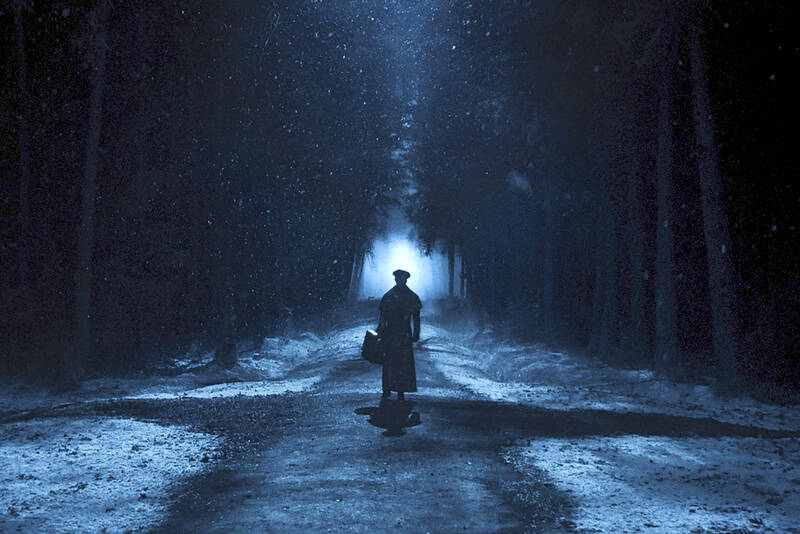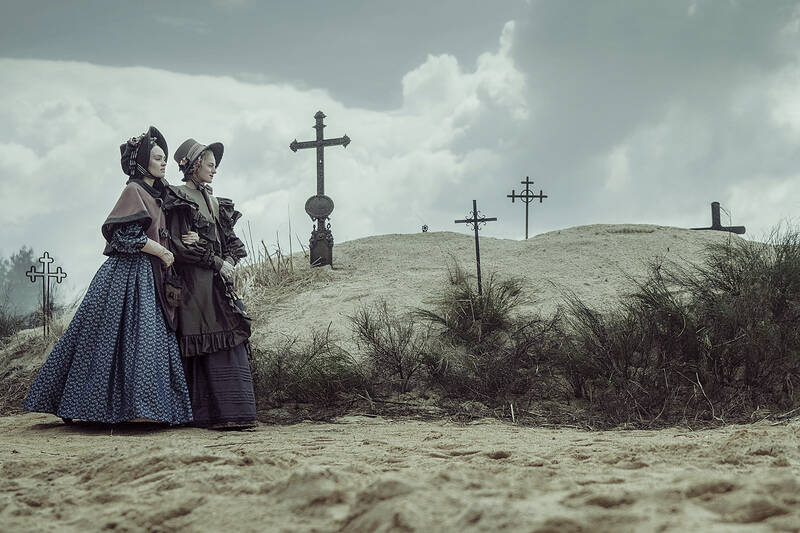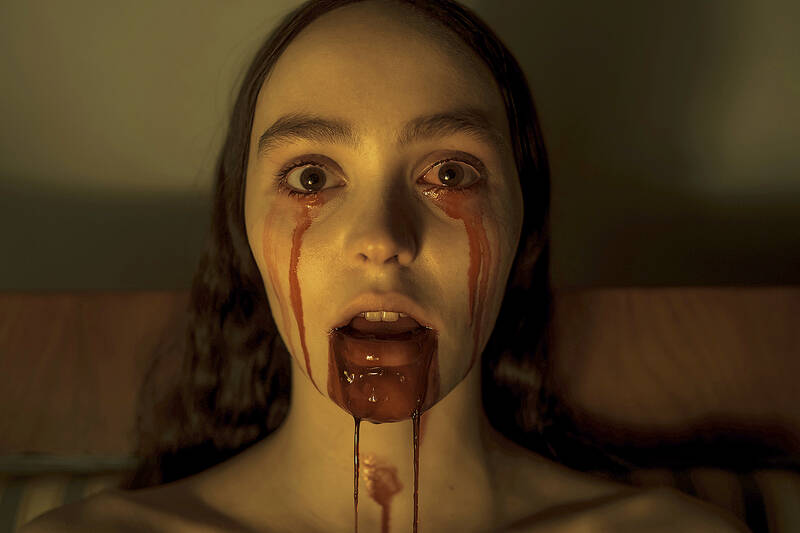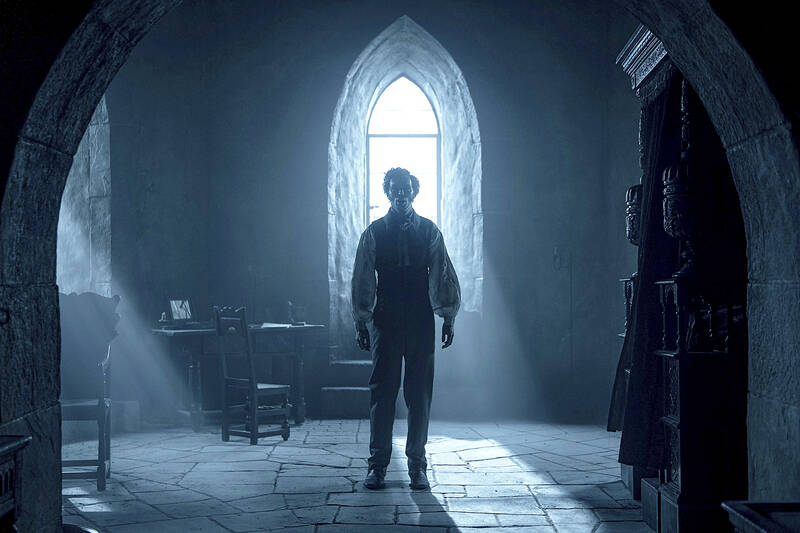Oh, the weather outside is frightful. But don’t head to the multiplex to stay warm. Not if you’re seeing Nosferatu, anyway. Bring your hand warmers, toe warmers, heart warmers and soul warmers — this update of the 1922 silent vampire classic will chill you to the bone.
But the film, in Taiwan theaters on Feb. 22, may not terrify you. Everything in Robert Eggers’ faithful, even adoring remake, from his picturesque 19th century German town to those bleak mountain snowscapes leading to that (brrr) imposing castle in Transylvania, looks great. But with its stylized, often stilted dialogue and overly dramatic storytelling, it feels more like everyone is living in a quaint period painting rather than a world populated by real humans (and, well, vampires) made of flesh and, er, blood.
Eggers, who writes and directs here, has described being haunted since youth with F.W. Murnau’s 1922 Nosferatu, starring Max Schreck (which borrowed so much from Bram Stoker’s 1897 novel Dracula that the author’s estate sued for copyright infringement). Eggers has said he wanted to present a true vampire, meaning the original folk variety — the horrifying, ugly, venal sort. Not the seduce-you-in-a-dinner-jacket kind.

Photo: AP
And certainly not the “veggie vampire” who drinks only animal blood (think Twilight). No, Eggers’ vampire, Count Orlok, wants only human blood — preferably from a lovely damsel.
The damsel here would be young wife Ellen (Lily-Rose Depp), the focus of Orlok’s obsessive desires. In a nod to changing times, Eggers brings the character to the forefront and suggests that in 19th century society, she was unfairly seen as “hysterical” when actually, she was, you know, possessed. The lovely Depp fully commits to the high drama — but we don’t learn much about what’s in her head. Like everything here, it’s a stylized performance that feels like a piece of art but keeps us at a distance.
After a prologue in which Ellen’s spiritual connection to Orlok is established, we begin our story in fictional Wisborg, on the Baltic coast. Ellen has just been married to handsome, fresh-faced Thomas Hutter (Nicholas Hoult, giving his all), who aims to gain employment with a real estate firm.

Photo: AP
But first, Thomas is told by the shady-looking boss, he must undertake an out-of-town assignment, traveling into the Carpathian mountains to obtain the signature of a shadowy client on the deed for a local fixer-upper. And he sets off, to the protestations of Ellen, who has been having some truly terrible dreams.
Note to self: When accepting job assignments, maybe think twice if your boss is sending you, solo, deep into wintry Transylvania? But if Thomas had used his noggin and sat home by the fire with his bride, we would have no movie.
Waiting for Thomas in the dark, lonely castle — the exteriors of which were actually filmed in Transylvania — is Orlok himself (Bill Skarsgard, truly unrecognizable in heavy, ugly makeup). They get down to business, but Thomas unfortunately cuts his finger, and his blood awakens a thirst in Orlok. Thomas soon realizes he’s in a very bad place and needs to get back to his wife forthwith.

Photo: AP
Back in Wisborg, Ellen is staying with the couple’s friends, the Hardings (Aaron Taylor-Johnson and Emma Corrin, not given much to work with), and suffering from seizures and spells. Orlok is calling to her, staking his claim. The friends are trying to help, and when traditional medicine fails they turn to a specialist in the occult — and a gift to the rest of us, because he’s played by Willem Dafoe.
Dafoe’s naturally witty presence gives us a sense of relief from the stylized dialogue as the movie travels to its inevitable conclusion, and surely what true horror fans are waiting for: Orlok’s climactic confrontation with Ellen.
For such fans, the frightening tableau of a skeletal Orlok lying atop a drained Ellen will be satisfying enough to make the experience worthwhile. The rest of us might leave with the same feeling we had in the beginning: a deep but distant chill.

Photo: AP

Climate change, political headwinds and diverging market dynamics around the world have pushed coffee prices to fresh records, jacking up the cost of your everyday brew or a barista’s signature macchiato. While the current hot streak may calm down in the coming months, experts and industry insiders expect volatility will remain the watchword, giving little visibility for producers — two-thirds of whom farm parcels of less than one hectare. METEORIC RISE The price of arabica beans listed in New York surged by 90 percent last year, smashing on Dec. 10 a record dating from 1977 — US$3.48 per pound. Robusta prices have

The resignation of Taiwan People’s Party (TPP) co-founder Ko Wen-je (柯文哲) as party chair on Jan. 1 has led to an interesting battle between two leading party figures, Huang Kuo-chang (黃國昌) and Tsai Pi-ru (蔡壁如). For years the party has been a one-man show, but with Ko being held incommunicado while on trial for corruption, the new chair’s leadership could be make or break for the young party. Not only are the two very different in style, their backgrounds are very different. Tsai is a co-founder of the TPP and has been with Ko from the very beginning. Huang has

A few years ago, getting a visa to visit China was a “ball ache,” says Kate Murray. The Australian was going for a four-day trade show, but the visa required a formal invitation from the organizers and what felt like “a thousand forms.” “They wanted so many details about your life and personal life,” she tells the Guardian. “The paperwork was bonkers.” But were she to go back again now, Murray could just jump on the plane. Australians are among citizens of almost 40 countries for which China now waives visas for business, tourism or family visits for up to four weeks. It’s

A dozen excited 10-year-olds are bouncing in their chairs. The small classroom’s walls are lined with racks of wetsuits and water equipment, and decorated with posters of turtles. But the students’ eyes are trained on their teacher, Tseng Ching-ming, describing the currents and sea conditions at nearby Banana Bay, where they’ll soon be going. “Today you have one mission: to take off your equipment and float in the water,” he says. Some of the kids grin, nervously. They don’t know it, but the students from Kenting-Eluan elementary school on Taiwan’s southernmost point, are rare among their peers and predecessors. Despite most of